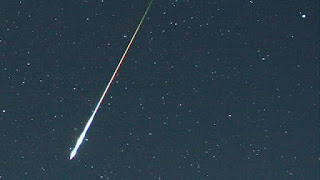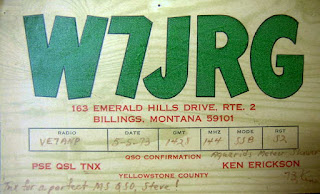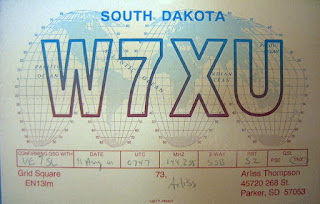 Perseids Peaking
Perseids Peaking
It's been a few years since I have been active on 2m meteor scatter during the Perseids meteor shower. The year's largest shower peaks tomorrow night, although the peak is sufficiently broad to provide activity over several days leading up to and after the night of August 12/13.
Nowadays, using FSK441 WSJT software, a lot of good fun can be had most non-shower mornings on meteor scatter, just using random meteors. My experience when using the same software during an actual shower has been disappointing, as often the signals are too strong or too long for the software which is looking for shorter, weaker signals. During a large shower such as the Perseids, where typical burns can be quite lengthy, my own experience has given better results with good old SSB or fast CW.
I clearly recall my first-ever meteor scatter QSO, made during the May Aquarids, back in the early 70's. I had arranged a sked with Ken, W7JRG, in Montana. I had grown up reading about Ken's VHF exploits in both QST and CQ as a teenager and was excited about the possibility of finally possibly working him. My station was homebuilt, using a 6360 transverter driven from my Heath HW-100, and feeding a homebrew 5894 amplifier with 1/4" copper tube plate lines. The amplifier produced just a shade over 100W output. My antenna, also homebrew, was a 24-foot 13 element Yagi ... probably not the best for meteor scatter although it worked well enough for me to ragchew every night with stations in Portland, Oregon on SSB.
A few minutes before our sked, I decided to make one final check of my system. Our sked was to be on SSB, using 15 second sequences. I keyed down at full-power and did a final tweaking of plate tuning and antenna loading, and unkeyed, back to receive mode after about 30 seconds of tuning up. My receiver immediately sprung to life with a very loud SSB signal, slightly off-tune. Thinking it was my local buddy, VE7BLF, calling me before the sked, I was surprised to hear a different voice ... it was Ken in Montana at S9++ ..."I've been holding my breath waiting for you to unkey there Steve ... thought you would never finish!"
Needless to say I was just as surprised as he was. We talked back and forth for about another 60 seconds before the burn finally dissipated and signals were gone. What a great introduction to meteor scatter, with the QSO completed before the sked even started! Ken later told me that of all of the meteor contacts he had made, it was one of his best ... I guess we just hit it right.
Of all the showers, I always found that the December Geminids was the best, even better than the August Perseids, at least for the North-South path. Having said that, my longest meteor contact was made during the Perseids, with Arliss W7XU in South Dakota ... just a shade over 1300 miles while running just 40W SSB to a 9el Yagi.
Good luck if you are doing some meteor scatter tomorrow or even if you are just watching the shower visually ... conditions should be ideal, if the skies are clear, as the very new moon's sliver does not rise until near dawn.
Steve McDonald, VE7SL, is a regular contributor to AmateurRadio.com and writes from British Columbia, Canada. Contact him at [email protected].Nowadays, using FSK441 WSJT software, a lot of good fun can be had most non-shower mornings on meteor scatter, just using random meteors. My experience when using the same software during an actual shower has been disappointing, as often the signals are too strong or too long for the software which is looking for shorter, weaker signals. During a large shower such as the Perseids, where typical burns can be quite lengthy, my own experience has given better results with good old SSB or fast CW.
I clearly recall my first-ever meteor scatter QSO, made during the May Aquarids, back in the early 70's. I had arranged a sked with Ken, W7JRG, in Montana. I had grown up reading about Ken's VHF exploits in both QST and CQ as a teenager and was excited about the possibility of finally possibly working him. My station was homebuilt, using a 6360 transverter driven from my Heath HW-100, and feeding a homebrew 5894 amplifier with 1/4" copper tube plate lines. The amplifier produced just a shade over 100W output. My antenna, also homebrew, was a 24-foot 13 element Yagi ... probably not the best for meteor scatter although it worked well enough for me to ragchew every night with stations in Portland, Oregon on SSB.
A few minutes before our sked, I decided to make one final check of my system. Our sked was to be on SSB, using 15 second sequences. I keyed down at full-power and did a final tweaking of plate tuning and antenna loading, and unkeyed, back to receive mode after about 30 seconds of tuning up. My receiver immediately sprung to life with a very loud SSB signal, slightly off-tune. Thinking it was my local buddy, VE7BLF, calling me before the sked, I was surprised to hear a different voice ... it was Ken in Montana at S9++ ..."I've been holding my breath waiting for you to unkey there Steve ... thought you would never finish!"
Needless to say I was just as surprised as he was. We talked back and forth for about another 60 seconds before the burn finally dissipated and signals were gone. What a great introduction to meteor scatter, with the QSO completed before the sked even started! Ken later told me that of all of the meteor contacts he had made, it was one of his best ... I guess we just hit it right.
Of all the showers, I always found that the December Geminids was the best, even better than the August Perseids, at least for the North-South path. Having said that, my longest meteor contact was made during the Perseids, with Arliss W7XU in South Dakota ... just a shade over 1300 miles while running just 40W SSB to a 9el Yagi.
Good luck if you are doing some meteor scatter tomorrow or even if you are just watching the shower visually ... conditions should be ideal, if the skies are clear, as the very new moon's sliver does not rise until near dawn.
















